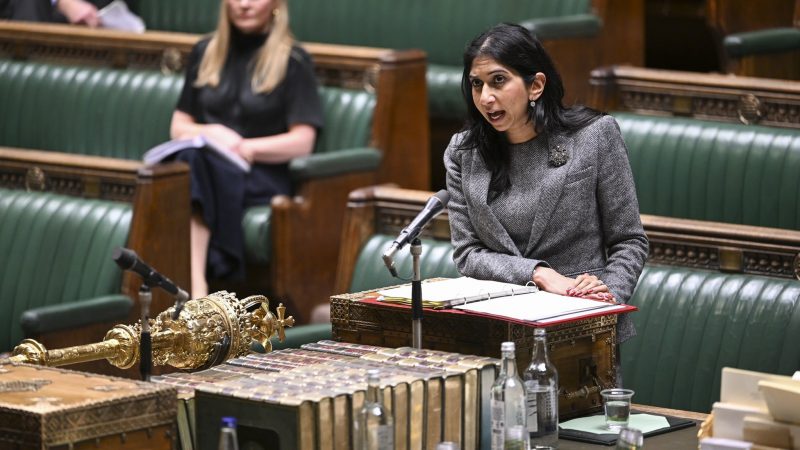
The government’s illegal migration bill continues to be debated in parliament. While Labour frontbenchers pointed out some of the flaws and inefficiencies of the bill, Labour’s topline messaging on migration is wrong and counterproductive. At the very least, Labour today should be leading its messaging with a call for safe and legal routes for all asylum seekers. But if it really wants to appear a bold and confident government-in-waiting, it should be championing the right to move across borders and popularising a message of hope and transnational solidarity.
Labour’s strategy thus far has been to reinforce right-wing messaging on migration, presenting it as a dangerous phenomenon in need of policing and control. Labour has repeated the Tory line conflating asylum-seeking with criminal activity and emphasising a law-and-order response. Not only is this narrative wrong in principle, it has failed time and again as an electoral strategy. Scapegoating migrants is Tory home ground. By triangulating, Labour will never present itself as stronger and harsher than the Conservatives on migration. Voters won’t be convinced, the Tory framework on migration will be confirmed and no real alternative will be put forward. Most importantly, it has harmful real-life consequences for refugees as the government responds with ever more authoritarian policy in an attempt to differentiate themselves. The Tories have no qualms in moving further right to prevent Labour outflanking them.
In 1997 and 2001, Labour won two elections with a much more open narrative on migration – however shallow that narrative ultimately was. For instance, one of its 1996 manifesto commitments was to drop the primary purpose rule, which New Labour duly abolished in 1997. Between 1997 and 2001, Labour championed the benefits of economic migration. The party’s rhetorical commitment to globalisation implied a pro-immigrant agenda, and this was reflected in much higher real migration figures. Early New Labour dared to be an opinion influencer by putting forward the positive case for migration. It failed to the extent that it did not go far enough, coupling the headline positive narrative with a secondary negative one emphasising borders and security.
Starmer’s Labour should seek to be a bolder opinion influencer. The backfiring of the BBC’s decision to suspend Gary Lineker was a rare and flukish moment in which positive messaging on migration was broadcast widely on mainstream outlets. Sports pundits and celebrities have championed an antiracist narrative. Labour should ride and develop this narrative, making sure this positive messaging does not just rely on spontaneous tweets by celebrity pundits but is implemented strategically, intentionally and powerfully.
Not only should Labour change its topline messaging to one of openness and welcome for refugees, Labour can use its platform to tackle the racism that underpins mainstream narratives on migration. In a interview with Sky News’ Sophy Ridge, John Barnes highlighted the particularly racialised nature of the government and media’s approach, emphasising the double standards of more welcoming attitudes towards Ukrainian refugees compared to the labelling of Syrian and Afghan refugees arriving on boats as potential ‘criminals’ and ‘rapists’.
Labour should be more loudly calling out the discrimination and discrepancy in government policy. The narrative should also be linked to Britain’s colonial history, which plays a continuing structural role in destabilising the regions many asylum seekers trying to reach the UK come from.
As research conducted by Another Europe Is Possible shows, the mainstreaming of far-right rhetoric around migration in the lead-up to the EU referendum was characterised by deep Islamophobia and anti-Muslim hatred. This continues to this day and is evident in the particular animosity shown towards refugees and migrants from Muslim-majority countries like Syria, Afghanistan, Sudan and Albania.
Labour can do more to tackle this specific anti-migrant hatred by working with the Muslim community to combat Islamophobia in rhetoric and substance. Amongst other things, the Another Europe report suggests creating more platforms and spaces for meaningful Muslim visibility and campaigning, as well as tackling Islamophobia within Labour’s own ranks. Acting on the recommendations of the Forde report is an important step.
Labour can also take the lead on building an internationalist challenge to the rise of the far right, working with European social democratic parties to create a meaningful transnational strategy on migration and antiracism. Linking up with the SPD in Germany, which recently elected the most diverse group of MPs to its parliament yet and has a more open policy on migration, would be a good place to start. Calling out poor responses is also important. For instance, human rights-based criticism of Emmanuel Macron’s targeting of the Muslim community in France – detailed in this comprehensive report by French political analyst Yasser Louati – is a key way to begin to build international solidarity.
Labour members, too, can campaign within the party’s democratic structures for better migration policy, for instance, by supporting the Labour Campaign for Free Movement, which has a past record of winning pro-free movement policy at national conference.
There are many ways to do the work on antiracism and build a world of welcome for refugees. It may even have electoral benefits. Labour should see itself as an opinion influencer not an opinion follower and take a bold step towards a transformed narrative on migration.




More from LabourList
‘Council Tax shouldn’t punish those who have the least or those we owe the most’
Two-thirds of Labour members say government has made too many policy U-turns, poll reveals
‘Two states, one future: five steps on the path to peace for Israelis and Palestinians’